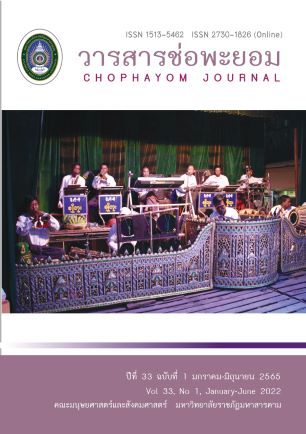“Her Name is…” Short Stories: The Image Presentation of Women Labour in South Korea Society
Keywords:
Short Stories, Female Characters, Women Labor-Force, South Korea, “Her Name is”, patriarchyAbstract
This article aims to reflect the South Korean female characters presented through women labour issues in the South Korea society from “Her Name is…”, 28 short stories by the Korean author, Cho Nam-Joo (조남주). The results revealed that the stories were written from the actual situation in South Korea society through the perspective of Cho Nam-Joo who was the writer and was a part of South Korea society herself. She intended to present the issues of women employees in South Korea society through the main female characters in each story. The issues presented through these short stories consisted of 1) a figure of entering and leaving the labour market of women with such reasons as: the expectation of the rural women, and the distress from economy and society, and the causes of leaving their jobs; 2) a figure of women labour-force depressing issues under the patriarchy culture in South Korea society, forexample, gender discrimination in workplaces, sexual harassment on working women and injustice of judgement in the case of sexual harassment; and 3) a figure of social movement and claim for women labour-force’s equal rights. The author reflected the society through her literature channel, therefore, the major female characters in the series of her short stories were the representatives of women in a South Korea society who were facing depressing issues under the patriarchy culture.
References
โชนัมจู. (2563). ชื่อของเธอคือ.... กรุงเทพฯ: บิบลิ.
ณัฐฌรีภรณ์ สกุลสัมฤทธิ์ และจิราภรณ์ อัจฉริยะประสิทธิ์. (2564). ผู้หญิงกับสิทธิเสรีภาพทางร่างกายภายใต้ระบบปิตาธิปไตยที่ปรากฏในนวนิยายเชิงอัตชีวประวัติ เรื่อง คิมจียอง เกิดปี 82. มนุษยศาสตร์และสังคมศาสตร์ มหาวิทยาลัยราชภัฏสวนสุนันทา, 4(2), 120-131.
ดำรง ฐานดี. (2550). ผู้หญิงในสังคมเกาหลี. เสนาธิปัตย์, 56(1), 122-132.
มุนฮย็อนนา. (2560). การเปลี่ยนแปลงของเศรษฐกิจเกาหลีและการเปลี่ยนแปลงโครงสร้างครอบครัวเกาหลี. กรุงเทพฯ: สำนักพิมพ์แห่งจุฬาลงกรณ์มหาวิทยาลัย.
รพี สุวรรณะชฎ. (2522). สาธารณกรณี: แรงงานสตรีในประเทศไทย. พัฒนบริหารศาสตร์, 19(4), 625-648.
เอมอร ดิสปัญญา. (2562). เสียงเรียกจากเกาหลี: วาทศิลป์ของนักเขียนสตรีชาวเกาหลีใต้. รามคำแหง ฉบับมนุษยศาสตร์. 38(2), 129-142.
Kyung-don. (2020). [Graphic News] 74% of women face discrimination: survey. Retrieved 10 May, 2022, from http://www.koreaherald.com/view.php?ud=20200308000270
Statistics Korea. (2020). Women’s Lives through Statistics in 2020. Retrieved 9 May, 2022, from https://kostat.go.kr/portal/eng/pressReleases/13/1/index.board?bmode=read&bSeq=&aSeq=385880&pageNo=1&rowNum=10&navCount=10&currPg=&searchInfo=&sTarget=title&sTxt=
Rich, T.S., Einhorn, M., Pergande, I. & Yanee,E. (2020). South Korea Split Over Perception of Workplace Harassment. Retrieved 10 May, 2022, from: https://interna tional.thenewslens.com/article/141566
Downloads
Published
How to Cite
Issue
Section
License
Copyright (c) 2022 Chophayom Journal

This work is licensed under a Creative Commons Attribution-NonCommercial-NoDerivatives 4.0 International License.






